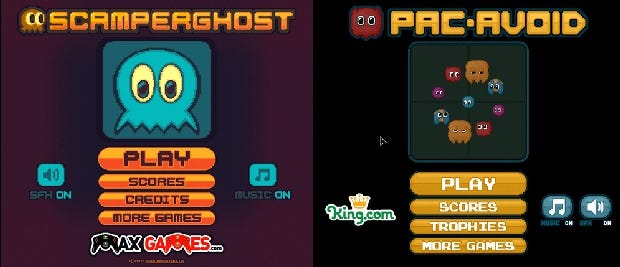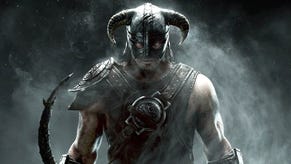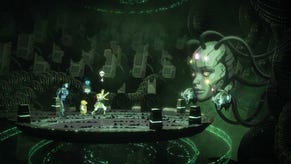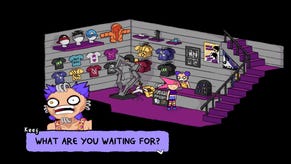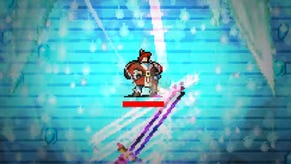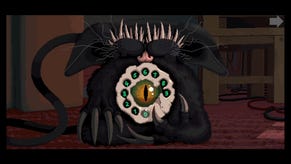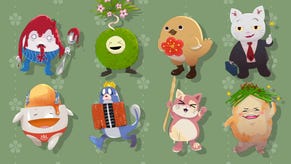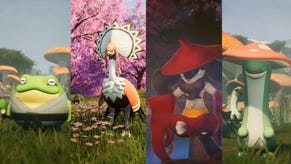Flash Developer Alleges King "Cloned" Their Game
Candy Crush Saga saga twists
Update 2: And there's now a statement from King.com on the subject, also at the end of the post.
Update: There's now a response from Matthew Cox (Junkyard Sam) at the end of the post.
This story is starting to turn into a saga in its own right. A developer is now alleging that the increasingly infamous Candy Crush Saga-creator King.com copied the design of one of their games. Stolen Goose are the creators of a game called Scamperghost, about avoiding ghosts, collecting coins and using slow-motion to dodge. In a post explaining the situation, they say they were contacted by King.com to license the game, but that they turned down the offer before signing any contracts when a better deal came through. They claim that King.com then copied the game by producing a clone called Pac-Avoid.
As always, it's not that simple.
If you haven't been following the King.com saga this past week, let's recap: King.com started filing trademark disputes against other game developers who use the word "Candy"; there was outcry as they targeted small teams and in response King defended themselves; then it turned out they were challenging The Banner Saga's trademark filing due to their use of the word "Saga"; and finally The Banner Saga developers responded. Phew.
This latest allegation is unrelated to any of the currently ongoing trademark disputes, though is meant to draw attention to an apparent double-standard. (And, one suspects, to the game artist's resumé).
As part of the post eplaining the alleged cloning, Matthew Cox (aka Junkyard Sam, and one of Stolen Goose's two creators) mentions that when Pac-Avoid was released, some "fellow Flash game developers were pretty outraged at the IndieGamer.com forum". There's no link, but this thread from February 12th 2010 is started by Junkyard Sam and discusses the situation.
There's some worthwhile context in the thread, about how often Flash games find themselves copied and the various potential or supposed defenses for that action. The issue is that a game design can't be patented, or trademarked like their name, meaning "cloning" is rife in the field. The practice is encouraged further by the way the marketplace is structured. Most Flash games make their money by signing deals with portals for exclusive use of a particular game. To compete, rival portals then create or commission their own version of those same game ideas. It's absurd, not creative, and there's little legal recourse available to stop it. If the afore-linked thread is anything to go by, a lot of Flash developers are either accepting or resigned to it.
The key piece of information within is that Cox says that Stolen Goose's Scamperghost was itself a clone. "Scamper Ghost was a clone of the flash game Particles. Directly. Scamper Ghost was 100% inspired by Particles (by RagDollSoft!)," although he also argues that "we really evolved the game quite a bit in our own direction." Particles can be played online here. The creator of that game turns up in the same thread and doesn't seem to mind.
It's also worth noting that, at this point at least, Sam says he would work with King.com again in future: "That being said - I don't hate King for this. I see it as a cold calculated business move - they wanted the game, couldn't get it - so they copied it. It's cutthroat - it's how they operate. I would still do business with them in the future."
On the second page of the thread, he gets more defensive of King after receiving "a pretty nice email from Lars", which is presumably the first email quoted in the King Copied post. He writes that, "1) We had tentatively accepted with King, and the large sum from MaxGames probably caused us to think the word "tentative" meant more tentative than it really should have been. In other words - we were probably wrong to back out and go with MaxGames. So King had been counting on getting this game and then took Pac-Avoid as an alternative."
The key difference between 2010 and now seems to be that Stolen Goose were initially under the impression that King.com had accepted a pitch for a similar game from another developer. They now say that this isn't the case, claiming that, "We tracked down the developer that made Pac-Avoid and it turns out they were contacted by King.com to clone the game!" (emphasis theirs).
The post ends by saying:
Scamperghost isn't the most original game in the world. It's obviously inspired by Pac-Man but we at least took it in an original direction by making it a mouse avoider with no walls.
King.com, however, showed no respect for other people's intellectual property when they made a direct, blatant clone of Scamperghost. Now they've trademarked "Candy" and are using their massive legal power against other small competing developers. A bit of a double-standard, eh?
Given the earlier admission that ScamperGhost "was a clone of the flash game Particles", it seems obfuscating to say only that it was "obviously inspired by Pac-Man". It also seems like there's more than one double-standard at work here. Maybe there's quadruple-standards.
What this is, is the point where the conversation about trademark disputes gets completely de-railed. It's the point where the collective anger against King.com and their actions gets warped in an attempt to make it about something else. That something else is also awful, but it's also more complicated than Junkyard Sam's post suggests, and it's too easy to allow existing frustrations to lead you into taking sides without first waiting for or looking for more information.
I've reached out to both King and Matthew Cox with some questions about the situation and will update this post when/if I hear back.
Update: Matthew Cox responded with the following comment, which I think clarifies his aim in writing the original post:
I don't really care that much that King.com copied our game. I have no interest or goal whatsoever of limiting other people's ability to create whatever they want. (As you point out, we smoothed things over with King a long time ago.) I only resurfaced this in response to the actions King is taking to limit the innovation of others.
King's treatment of our intellectual property combined with their partial use of NAMCO's trademark Pac(man) in their copied game shows extreme hypocrisy.
They're in the process of trademarking a common word -- "Candy" -- and have already taken action against other apps like Candy Slots, for example.
By trademarking the word "Candy" they limit all of our freedom whether we're big or small... You can't make a Candy game. I can't make a candy game. Not even great candy empires like Hershey, Ferrara, or Jelly Belly can make candy games.
Thanks to Matthew for getting in touch in answer to some of my questions.
Update 2: There's now an official statement from King.com on the subject, which directly contradicts some of the original allegations.
"King does not clone other people’s games. King believes that IP – both our own IP and that of others - is important and should be properly protected. Like any prudent company, we take all appropriate steps to protect our IP in a sensible and fair way. At the same time, we are respectful of the rights and IP of other developers. Before we launch any game, we do a thorough search of other games in the marketplace, as well as a review of trademark filings, to ensure that we are not infringing anyone else’s IP. However, for the avoidance of doubt, in this case, this game – which was coded by a third party developer 5 years ago - has been taken down."
